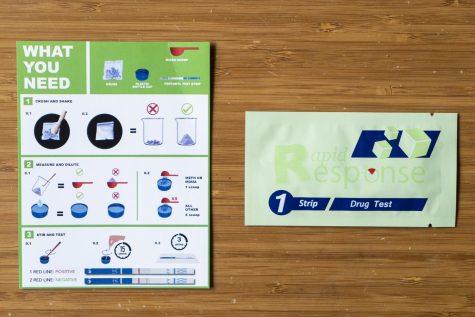The Rise of Fentanyl in King County: Is It a Concern for Seattle University?
MDMA capsule. Fentanyl laced Psychostimulant overdose deaths in the United States have more than quadrupled over the past ten years according to the national institute on drug abuse.
Fentanyl, a synthetic opioid 50 times stronger than heroin, is on the rise in King County. The drug has been known to produce heroin-like effects on the user, but even in very small amounts, it can cause fatal overdoses.
Benjamin Adams, a first-year mechanical engineering major at Seattle University, highlighted the demographics at an increased risk for coming into contact with fentanyl.
“I think people of a lower socioeconomic status are being targeted,” Adams said. “Younger people are also very prone.”
Fentanyl is often mixed with other common drugs like marijuana and methamphetamines. Drugs laced with fentanyl are often unbeknownst to the buyer, which can be incredibly dangerous. Fentanyl-related overdoses have almost doubled over the last two years with over 685 deaths in 2022 and 385 deaths in 2021.
Seattle U’s Director of Wellness and Health Promotion Chris Fiorello reminded students that purchasing drugs legally helps guarantee a safer product.
“Since cannabis is legal in Washington, people buying marijuana could become victims of a fentanyl overdose as the marijuana could be laced or tampered with at any time during its distribution. It is advised to buy cannabis from dispensaries as it will ensure a safe product,” Fiorello said.
While fentanyl use is rising in King County, some students are looking towards Seattle U to protect its potentially vulnerable populations. Michael Albert, a second-year anthropology and sociology double major, is concerned there may not be adequate resources for Seattle U students and faculty struggling with addiction.
“I think Seattle University should invest in more resources that’ll help students and faculty with substance abuse. For people struggling with addiction, Counseling And Psychological Services serves as a very good resource.” Albert said.
Adams also believes that there should be better resources on campus to help those struggling with addiction.
“Given that there has been a recent death involving drug use, I believe more resources should be available for Seattle University students and faculty, along with education about the dangers of substance abuse,” Adams said.
Fiorello emphasized that Seattle U is working to help students with substance abuse, but that fentanyl is not a centerpiece of education or treatment options.
“Any use of legal or illegal drugs on campus is a concern. In terms of resources, there’s a wide variety of resources available, we do maintain a list of students in recovery, and put students in recovery together. Additionally, there are public education programs we do. However, much of our efforts are focused towards more common drug misuse like cannabis, alcohol and Adderall,” Fiorello said.
Regarding addiction recovery programs, Fiorello pointed out that student insurance can limit what resources they have access to.
“We are aware of the concerns, and we have resources available for students. In terms of students seeking help for recovery, some of the options are insurance-dependent,” Fiorello said.

With fentanyl-related deaths rising each year in King County, conservative commentators think that a tough approach on crime is the way to keep everybody safe. However, progressive critics and some Seattle U students believe the criminal justice system in King County shouldn’t be the only one to bear the authority in aiding those with substance abuse issues.
“I don’t think the responsibility falls solely on the criminal justice system, I believe they should help people struggling with addiction, instead of arresting them for having drugs. I know that most police officers carry Narcan, which is a step in the right direction, but I believe Narcan should be easily accessible for those who may be struggling with addiction, or know someone in a similar situation,” Adams said.
Narcan, known pharmaceutically as naloxone, is a medication that can reverse opioid overdoses. Having naloxone or a similar drug, suboxone, in close proximity can mean the difference between life or death for people who overdose on fentanyl. While Seattle U does not currently provide Narcan directly, Washington State has a public standing order that allows anybody to get naloxone from a pharmacy or via mail without a prescription.
While addressing concerns with fentanyl hasn’t been a direct focus for Seattle U, it could become a higher priority in the coming months as the presence of the drug locally continues to rise. Easier access to life-saving resources like Narcan and rehabilitative treatments could make a difference to people struggling with addiction and substance abuse.


